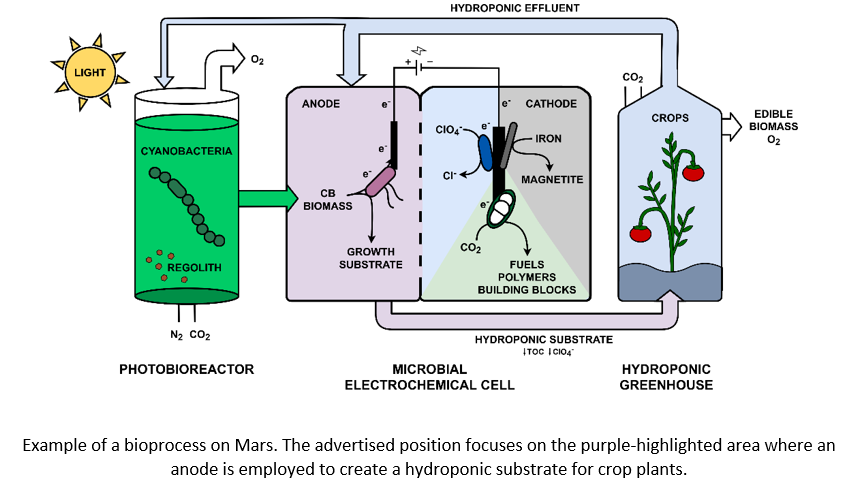Materarbeit: Anodic conversion of cyanobacterial biomass into a growth substrate for Mars in situ resource utilization

Establishing a long-term human presence on Mars will require the ability to produce materials from on-site resources. The alternative, sending materials from Earth, is unrealistic given the high launch costs and risks associated with long-distance resupplies. In general, there are no substantial sources of organic carbon or fixed nitrogen on Mars. This is an impediment to the application of bioprocesses as several industrially-relevant organisms are not capable of fixing carbon dioxide and/or nitrogen. As such, cyanobacteria have been proposed as primary producers to feed these bioprocesses since they can grow solely on Martian resources. Utilizing this cyanobacterial biomass as a feedstock requires a pre-processing step as the “raw” material is not easily metabolized. Microbial electrochemical systems (MES) may be the solution: an anodic compartment could serve as a platform to process cyanobacterial biomass into a suitable growth substrate for microorganisms and plants. The goal of this project is to develop the cyanobacterial-processing anode.
Research questions:
- What microbial communities are best to colonize the anode and oxidize the cyanobacterial biomass?
- How does the microbial community functionalize the cyanobacterial biomass? What are the products of interest to feed different types of bioprocesses on Mars?
- For a selected microbial community: What are the best culture parameters? For example:
- Biomass pre-treatment options;
- Voltage applied;
- Anode material;
- Temperature;
- Organic loading rate;
The general approach for this work will be the cultivation of pre-selected microorganisms in H-cells with a cyanobacterial biomass medium. This is followed by an analysis with qPCR, HPLC, fluorescence microscopy and electrochemical techniques.
Learning goals :
- Planning and execution of a research project;
- Cultivation techniques for a variety of different microorganisms (e.g. thermo- and mesophilic; aerobic and anaerobic);
- Set-up and operation of microbial electrochemical systems;
- Interpretation of the data from the analytics cited above;
- Communication of scientific work both in oral and written forms.
In collaboration with:
Laboratory of Applied Space Microbiology from the Center Of Applied Space Technology And Microgravity (ZARM), University of Bremen
Beginning from:
September 2023
Language:
English
Period of time:
4 -6 months
References:
Verseux, C. et al. Sustainable life support on Mars - The potential roles of cyanobacteria. Int. J. Astrobiol. 15, 65–92 (2016).
Ndayisenga, F., Yu, Z., Yu, Y., Lay, C. H. & Zhou, D. Bioelectricity generation using microalgal biomass as electron donor in a bio-anode microbial fuel cell. Bioresour. Technol. 270, 286–293 (2018).
Contact:
M. Sc. Tiago Ramalho (tramalhoprotect me ?!uni-bremenprotect me ?!.de)

